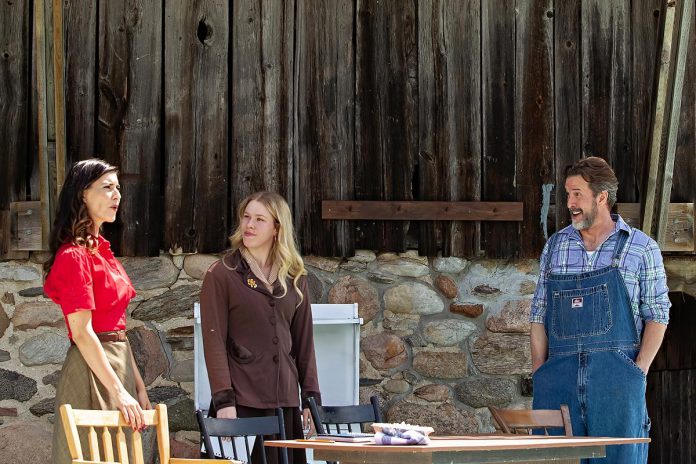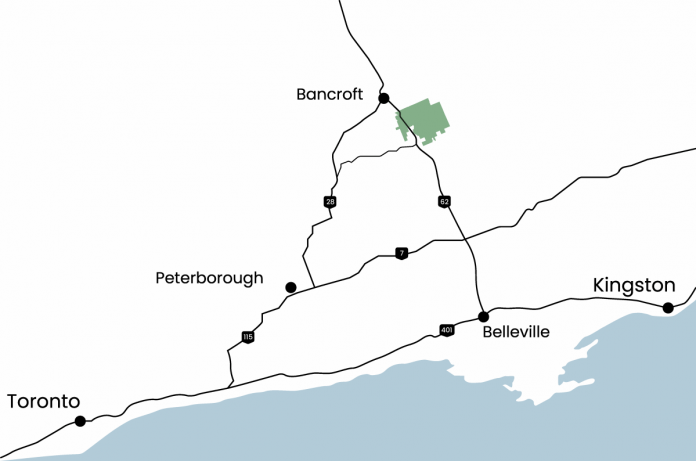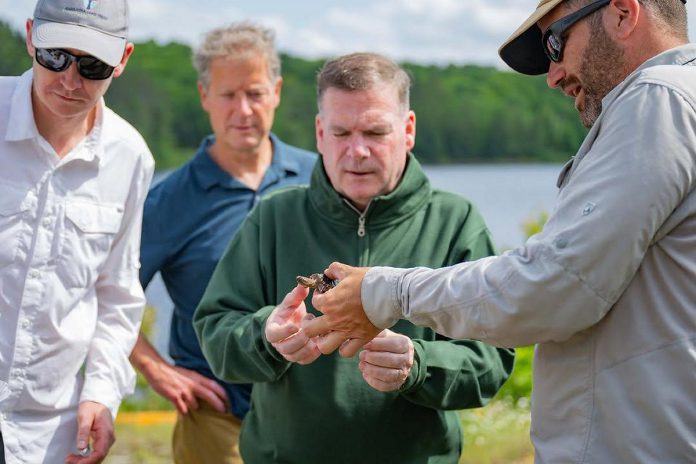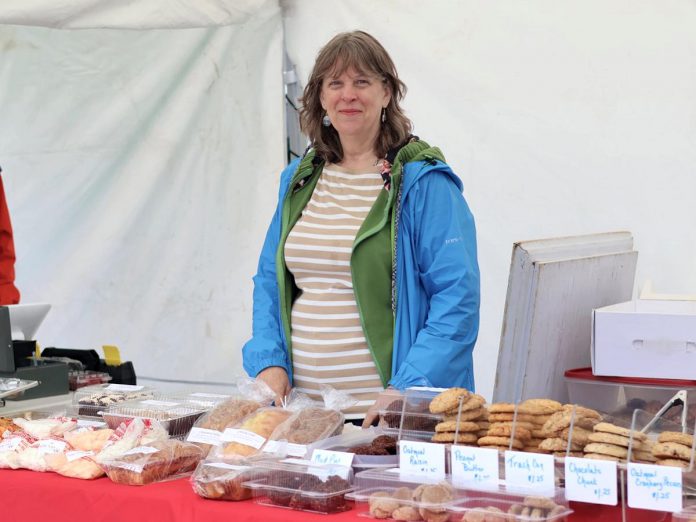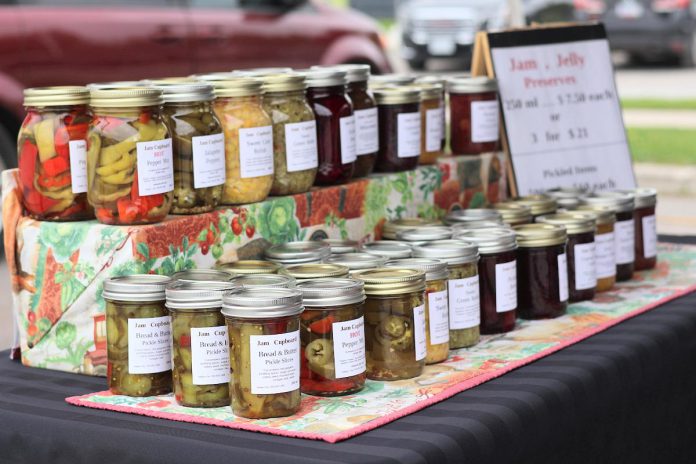Almost 30 years after they co-wrote their first play for 4th Line Theatre in Millbrook, Robert Winslow and Ian McLachlan have collaborated once again for the opening production of the outdoor theatre company’s 33rd season.
Canada Day at the Winslow Farm will see the world premiere of The Housekeeper, the fourth in a series of plays by Winslow and McLachlan about the Barnardo children and their impact on Canadian culture and history.
During a media event held Wednesday (June 18) at the theatre’s Winslow Farm venue, McLachlan elaborated on his decades-long friendship with Winslow, and what works for them as they co-create.
“Probably 80 per cent of this play was written in Rob’s kitchen,” recalls McLachlan, noting their relationship dates back to the mid-1970s when Winslow was a student of his at Trent University, where McLachlan still teaches.
“I probably wouldn’t do any (writing) work now if it wasn’t for Rob. We enjoy each other’s company a lot, and we enjoy talking about everything, from the state of the world to history, philosophy and literature. Rob is a bigger reader that I am.”
“Rob will probably tell you differently, but my sense is he started 4th Line Theatre in order to stage The Cavan Blazers. The first play we did (together) here was Crow Hill: The Telephone Play (1997, restaged in 2004 and 2018), which is not related to the Barnardo children story. When we did Carmel (in 2019), we were thinking about a series of plays that really talked about an Ontario community over a period of 100 years.”
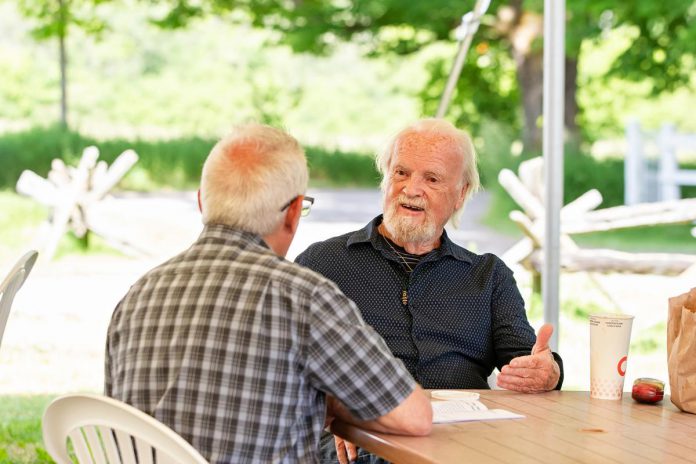
So it was that The Housekeeper came to be, the teacher and the former student hunkering down, face-to-face for the most part, and continuing the story that has served 4th Line Theatre and its audience so well.
Winslow and McLachlan first introduced the characters of Walter White and Billy Fiddler, two Barnardo children, in 2005’s aptly titled Doctor Barnardo’s Children (restaged in 2006 and 2014). Barnardo children were named after philanthropist Dr. Thomas John Barnardo, who brought as many as 35,000 orphaned and poverty-stricken children to Canada from Great Britain between the 1870s and 1939.
This was followed in 2014 by the second play in the series, Wounded Soldiers, which recounted Billy’s experience (and its aftermath) as a Canadian soldier in World War I. The third play, 2019’s Carmel, picked up Billy and Walter’s story in the late 1930s during the height of the Great Depression, when Billy returns as a transient worker to the Kawarthas where his childhood friend Walter is raising a family with his strong-willed wife Abagail on a farm located on Carmel Line in Cavan.
Set in 1955, The Housekeeper finds a now-widowed Walter (played by Jay Davis) living in Millbrook when a mysterious woman arrives in the village. Looking for a job, Eleanor Gwyn (played by Julia Scaringi) sees being the housekeeper for Walter as a good fit.
While Eleanor is anxious to put down roots in a place she can call home and effectively find a fresh start, local tongues begin to wag with the gossip mill working overtime. Eleanor may be ready for Millbrook, but there’s a question around whether Millbrook is ready for Eleanor and her progressive world views.
Ultimately, the play explores the duality of the welcoming and easygoing nature of small towns and their penchant for being wary and suspicious of newcomers.

For Scaringi, The Housekeeper marks her third 4th Line Theatre appearance, having performed in one of the re-stagings of The Cavan Blazers and in 2022’s The Great Shadow. She says her “sense of familiarity” with the theatre company makes her very comfortable.
“I have the gift of having experience here,” she says.
“I’ve grown a lot of relationships here that I’ve nurtured, with (managing artistic director) Kim Blackwell, and community members that I’ve acted with. A few summers ago, I lived with a local family. I became quite close to the Chessers (Indigo Chesser acted in The Great Shadow). I do feel as if I’ve built a community that’s nice to return to.”
Speaking to her character, Scaringi says Eleanor Gywn “lives in a way that I almost aspire to.”
“She’s very free, especially in a time that feels oppressive to all kinds of humans, women specifically. Her way of seeing the world is quite open and accepting, and she wants to be who she is. I think, at the end of the day, isn’t that what everybody wants? Isn’t that what we’re all striving for? To be who we want to be, and have people see us that and not try to change us.”
Davis, meanwhile, is making his 4th Line Theatre debut, bringing to the production his 30-plus years of stage experience in Toronto and abroad. He says he did his homework beforehand, and was enticed by what he heard.
“Some actors that I respect messaged me and wrote ‘You’re going to have the best time — you’re going to have the best summer,” says Davis. “Every time we have like a little five-minute break, I sit somewhere and just look around. We’re in this valley and you can just see everything in the horizon.”
Punctuating the fact that 4th Line Theatre offers actors a setting that is much different than what they’re accustomed to, such as the haying of the field that serves as the theatre’s parking area being carried out during this sit-down.
“As soon as I read it, I was like ‘This is really smart,'” Davis says of McLachlan and Winslow’s script. “As we were going through it and discovering what the scenes are about, even though it was written (to take place) a while ago, I was struck by how relevant those scenes are to what’s happening right now in our world.”
To prepare for his portrayal of Walter, says Davis, he familiarized himself with the Barnardo children series of plays.
“It gives you a better idea of where he (Walter) is coming from and where he is going to, and just who he is,’ Davis says.
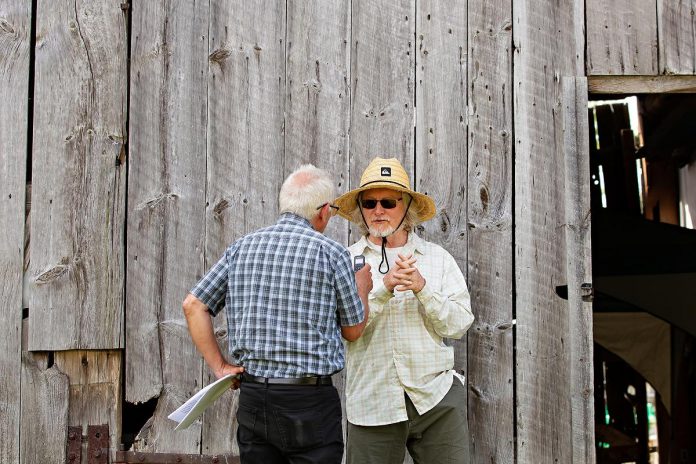
Meanwhile, taking in the event proceedings from a distance, was Winslow, who is directing the play he co-wrote with his longtime collaborator. He spoke of their “mutual respect” for each other.
“I might focus on (on something), he might focus on something else, but it comes together and it makes a good thing — sort of like a hockey team or a good musical duo,” Winslow says.
“I know him (the Walter character) pretty well now, so it’s easy to write him. But the main character in this is a woman who comes to Millbrook from a different part of Ontario and has a troubled past. That’s a whole new side of things that we just came to for the first time. I think it’s one of the best, most-rounded female characters we’ve written. You know, right up there with Alice from Crow Hill.”
With opening night sneaking up quickly, the man who has brought so many of his plays to life at the Winslow Farm is looking forward to the debut of The Housekeeper, for sure, but there’s something else that has consistently excited him more.
“It’s been a while since I directed and I’m really enjoying the process,” says Winslow, who also directed Carmel in 2019.
“Opening night is opening night but, for me, it’s the process of getting there. I could watch opening night or not watch opening night. It doesn’t matter to me. Sometimes I’ll come in like two days later when all the woo-hoo is over, but it’s great. I feel privileged and happy to be able to do this.”
For Scaringi, she’s been doing this too long to be nervous. Instead, she sees performing her role before an audience as the work continuing “in a new way.”
“How do I build a relationship with them, and how am I deepening my relationship with my fellow actors? What new discoveries am I making from my character and from the relationships within the play? I want to be present to the aliveness of what’s happening. To keep it alive, and in the moment, and growing. I look at it as ‘Hey, this is another opportunity for me to see what I can find.'”
Meanwhile, for fans of the Barnardo children series of plays, both Winslow and McLachlan reveal a fifth play is in the offing, titled, at this point, The End.
The Housekeeper also stars Kiana Bromley, who’s appearing in her third 4th Line production, and Hilary Wear, who, as assistant director, is doing double duty.
Along with Winslow as director, the creative team also includes costume designer Bonnie Garland, set designer Esther Vincent, musical director and composer Justin Hiscox, sound designer Steáfán Hannigan, and fight director Edward Belanger, with Gailey Monner and Mikayla Stoodley on the stage management team.
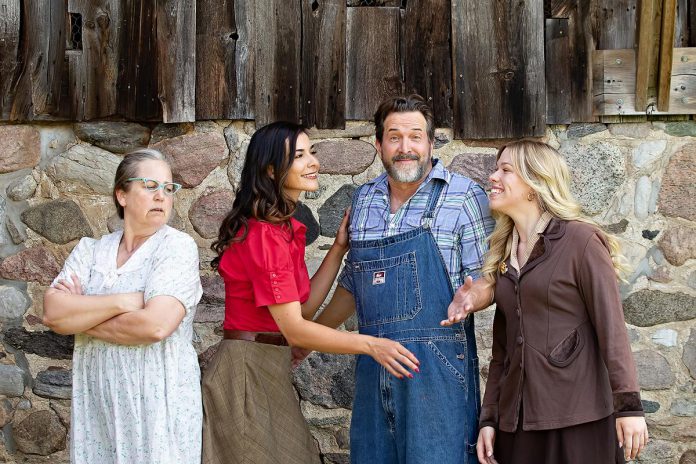
The Housekeeper will run at 6 p.m. from July 1 to 19, with preview nights on July 1 and 2, opening night on July 3, and performances on July 4 and 5. After opening week, performances run Tuesdays to Saturdays from July 8 to 12 and 15 to 19, with an additional Monday performance on July 14. The play contains mature content and is recommended for audience members 16 and older.
Tickets are $52 for adults and $45 for youth, with a discounted price of $38 for both adults and youth on preview nights, plus tax and fee.
Tickets, season subscriptions, and gift certificates are available by phone at 705-932-4445 (toll-free at 1-800-814-0055), online at 4thlinetheatre.on.ca, and at 4th Line Theatre’s box Office location at 9 Tupper Street in Millbrook.

kawarthaNOW is proud to be a media sponsor of 4th Line Theatre’s 32nd season.






















